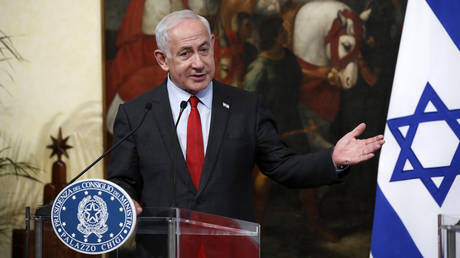Netanyahu suspends judicial reform
Israeli PM Benjamin Netanyahu has announced the suspension of the controversial judicial overhaul after months of protests. source:TROIB RTS

The move comes after months-long protests across Israel
Israeli Prime Minister Benjamin Netanyahu has announced the suspension of the controversial judicial overhaul, after months of massive nationwide demonstrations.
In a statement on Monday evening, Netanyahu said that he ordered a “timeout” on the controversial legislation until after the Knesset recess, in order “to give a real opportunity for real dialogue.”
He condemned “a minority of extremists that are willing to tear our country to shreds, leading us to civil war and calling for refusal of army service,” which he called “a terrible crime.”
Earlier, local media reported that the Israeli PM held lengthy discussions on the matter overnight with his political allies. The reform is a key demand of National Security Minister Itamar Ben-Gvir. His Otzma Yehudit party has just six seats in the Knesset, but if it leaves the governing coalition, Netanyahu will lose his majority and have to call another election.
The announcement comes after Netanyahu fired his defense minister, Yoav Gallant, who challenged the reform, arguing that it threatens national security. The move added fuel to the protests, with hundreds of thousands of people taking to the streets across the country.
As the protests intensified, resulting in clashes with police, Israeli President Isaac Herzog urged the governing coalition “to stop legislation immediately,” adding that the unrest is threatening the nation’s security, economy, and society.
READ MORE: Israel nearing civil war – president
Israel’s largest labor union, the Histadrut, called for a general strike on Monday. The strike shut down the Ben Gurion international airport in Tel Aviv, much of Israeli healthcare, and even embassies and consulates around the world.
The reform was meant to limit the power of the Supreme Court to rule against the legislative and executive branches of government, while granting the governing coalition a majority on the committee that appoints judges. The proposal met fierce opposition, with opponents describing the overhaul as an attack on democracy.












